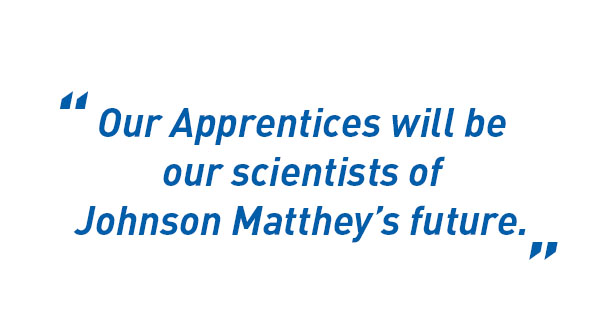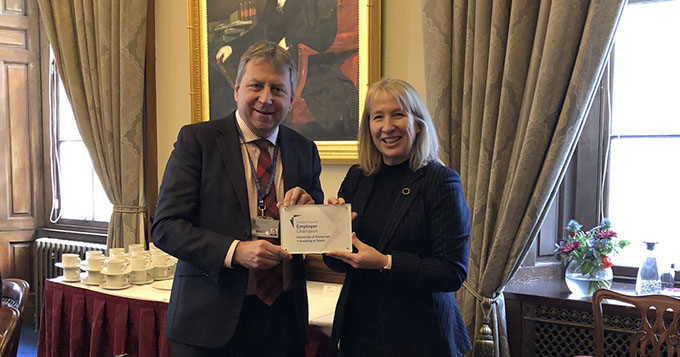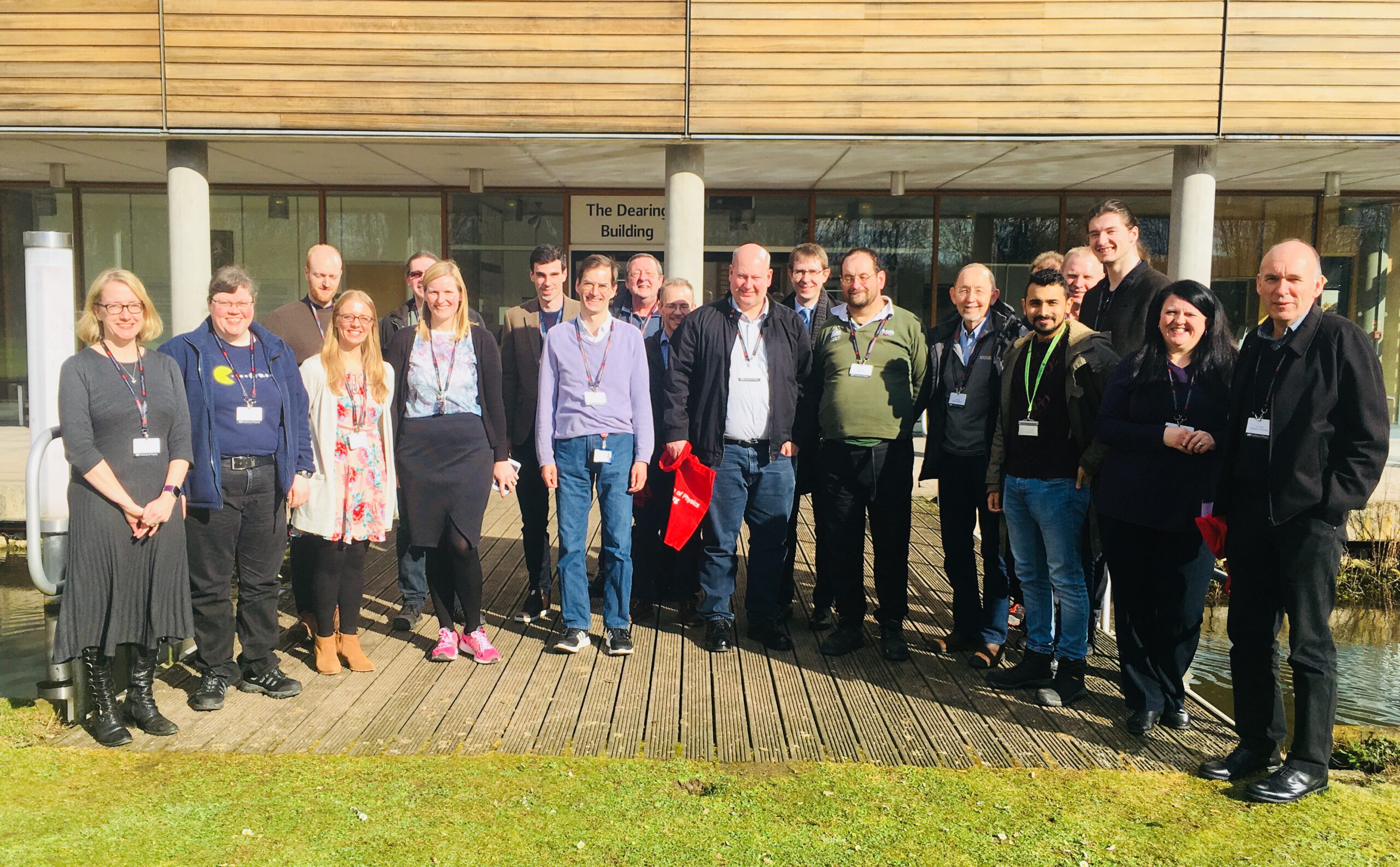

The Science Council collaborated with Employer Champion, the University of Nottingham, to interview Johnson Matthey on their successful partnership as a training provider for the Laboratory Science Apprenticeship Degree. Read below to find out more:
What is the role of Laboratory Science Apprentices at Johnson Matthey?
Our apprentices work within our Research and Development departments at Johnson Matthey as Research Assistants. They join established research teams working on business priority projects. The majority of their work is in our laboratories, carrying out practical work required to develop our new products and processes.
What impact are the Laboratory Science Degree Apprentices having on your organisation’s research?
The apprentices provide much needed baseline resources for our research departments. They provide a fluid resource for our business that can be tapped into when and where required, allowing for easy movement of people to align with business demand, project prioritisation and/or backfilling in preparation for retirement, to cover illness or maternity leave. The Laboratory Science Degree Apprentices scheme allows Johnson Matthey to create a sustainable work force with the right skill sets for the future of our business.
What benefits are the Laboratory Science Apprentices bringing to Johnson Matthey?
Our apprentices provide many benefits to Johnson Matthey. The apprentices complete critical base level laboratory work allowing more experienced employees to look at more complex tasks or developmental work. This helps to grow the business and provide faster project completions. Recruitment of apprentices also helps to develop existing staff giving them an entry point to line management skills and experience. As the apprentices in Johnson Matthey are on placement rotation, they provide a more fluid work force enabling us to move resources to business priority project either by working directly on the project themselves or back filling when more experienced staff are move onto projects. Apprentices also provide a fresh approach and views to our research teams where their enthusiasm and motivation is infectious to all around them.
What would you say to an employer considering training their workforce via the Laboratory Science Degree Apprenticeship?
Do it! We have run an apprentice scheme for many years now and have found the scheme provides benefits to both our business and our existing employees. Our retention rate of our Apprentices is high, with some Apprentices still working in Johnson Matthey over 20+ years later. Although the majority of Apprentices stay within our technical area’s others have branched out into other functions within our business such as engineering, commercial and quality and assurance.
What part will Apprenticeships play in the future development of Johnson Matthey’s workforce?
Our Apprentices will be our scientists of Johnson Matthey’s future. They feed the resource pipeline for our technical work force. Our apprenticeship programme allows Johnson Matthey to recruit high calibre loyal Scientists who have developed their careers within Johnson Matthey culture and values.
How does the Laboratory Science Apprenticeship and associated training at Johnson Matthey allow students to grow and excel in their career?
Our Laboratory Scientist Apprentice scheme allowed the Apprentices to gain hands on real business work experience within research to completement their studies at the University of Nottingham. It allows them to work on business priority projects and use world class facilities as well as being trained by experienced scientists. We also provide training for the Apprentices outside of the laboratory such as health and safety, scientific writing, project planning and IP to name just a few. We provide a supportive and encouraging environment for the Apprentices giving them a range of experiences within their first 5 years at Johnson Matthey. This allows them to gain a breadth of experience and practical skills as well as the opportunity to assess first-hand which areas they are most interested in and enjoy working in. Johnson Matthey support the Apprentices in their studies towards a degree providing them with resources and experienced members of staff to help them.
Graham Lightfoot, Research Assistant and Laboratory Scientist Apprentice:
What are your day to day tasks as a Laboratory Science apprentice?
It all depends on the placement, I’m in my second one now and the variety of tasks I’ve done is one of the great things about the scheme. In my first placement I was supporting a project that removed a toxic substance from one of our products. This involved trialling different heating profiles, then doing titrations to determine the amount of toxic substance present in the samples, as well as completing other analysis. In my current placement I’m looking at the flow properties of different chemicals which will support plant design and the manufacture of products. It’s a branch of science I’ve never really thought of before and it’s really interesting learning about it, especially when working with leading experts on the subject and with the state-of-the-art technology in the lab. Outside the day to day tasks though you are encouraged to look for other opportunities and people are willing to teach you – it is what you make of it.
Why did you decide to take the degree apprenticeship route?
My plan in college was to go to university, get my degree, and find a job in the industry. The Degree Apprenticeship just seemed like a better way of doing it since I do all these things anyway except without the debt at the end of it and with a much easier time of finding a job with five years’ experience and a foot in the door – all while getting paid a decent salary and good benefits.
How have your skills improved since starting the Degree Apprenticeship programme?
I’m much more confident on the practical side of things, since I’m spending a lot of my time working in the lab. I’ve also developed my communication skills, especially in my presentations and report writing. I’ve started to learn coding to help with my data analysis as well.
How is the apprenticeship helping you to achieve your career goals?
At this point I don’t really know where I want my career to go, but the breadth of the experiences I’ve had in the apprenticeship is helping with that. Working in interdisciplinary teams gives you a lot of contact with different branches of the business, so you get some experience of that. There are so many technical aspects to work as well, and generally the scientists working with that piece of equipment or on that project want to talk about it, so you can learn a lot if you ask.
What would you say to someone considering the Laboratory Science Degree Apprenticeship?
It’s a great opportunity for your career but it’s not for everyone. Get in touch and find out more. If you can it might be worth trying to get some work experience in a lab setting to see if you enjoy it. Weigh up the pros and cons and see if it works for you.
Are you engaged with a professional body as a student member and do you intend to gain professional recognition on completion of your apprenticeship?
On completion of the apprenticeship I’ll have a BSc in Chemistry with Industry from the University of Nottingham, as well as our degree apprenticeship certificate. With 5 years’ experience on top of that there’s lots of other opportunities for recognition, like become a Registered Scientist.
Find out more about the apprenticeship with University of Nottingham here.



